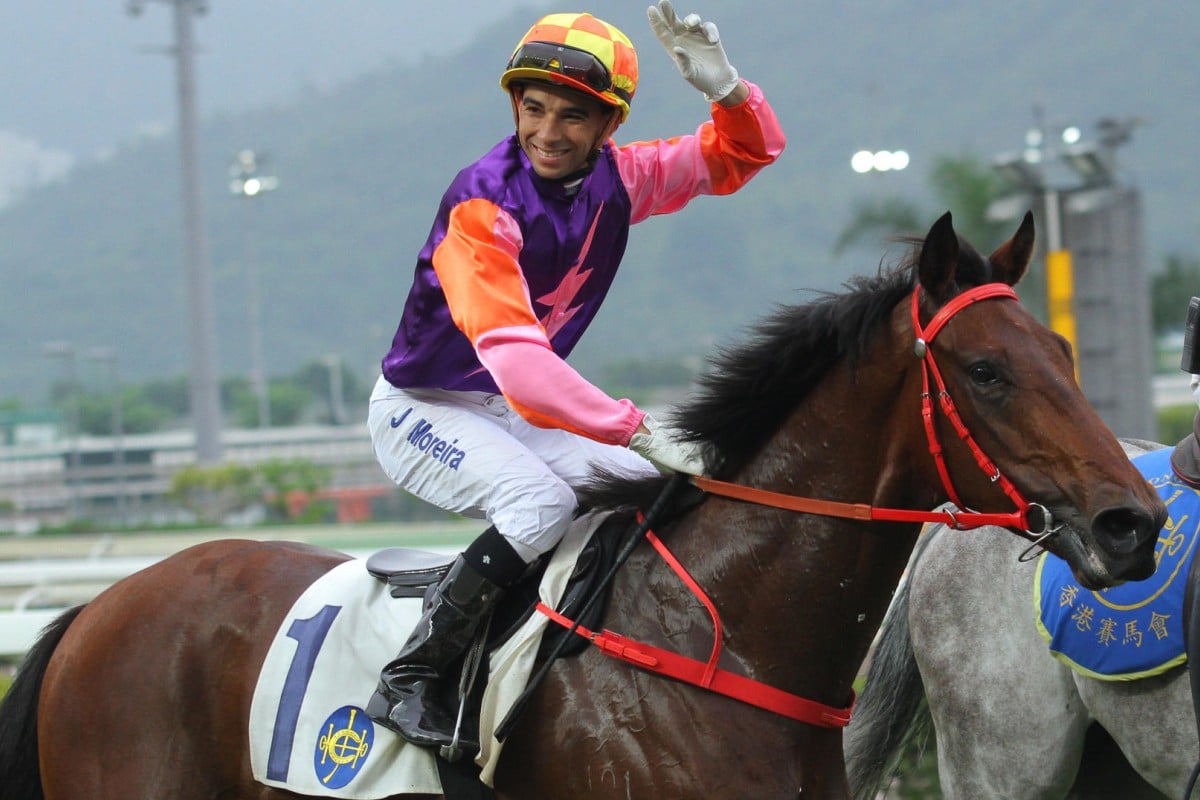Joao Moreira's new record for wins in a season, and what will be a runaway first championship win likely to be followed by more, remind us that life is full of circles and sometimes getting what you wish for has its ups and downs.
Let's go back near a decade, to around the midpoint of Douglas Whyte's hold on the jockeys' championship. In fact, it has a nice symmetry going back to 2006, the year Whyte set the 114-win record in his sixth successive championship victory and beat runner-up Brett Prebble by 51 wins.
It was known then that, whilst Whyte's champion status was rightly celebrated by the Jockey Club, there were those at Sports Road who felt total dominance was not a good thing. Jockey championships pretty much everywhere are plays with two or three players at most - think Whyte-Prebble, Whyte-Basil Marcus, think Tony Cruz and Gary Moore. That's usually the way it is but there was a feeling that a single jockey with so much control, pull - call it what you will - wasn't necessarily ideal.
It was always felt to be a quiet factor in the Jockey Club lifting its "ban" on Darren Beadman in 2007, an effort to bring Whyte some more competition, and probably had a part in the club's dogged pursuit of Moreira in 2013. He was on the radar anyway but Whyte's 13th straight championship would have given more impetus to the chase.
 In 2006, Douglas Whyte set a 114-win record in his sixth successive championship victory, beating Brett Prebble by 51 wins. There were those at Sports Road then who felt total dominance was not a good thing.
In 2006, Douglas Whyte set a 114-win record in his sixth successive championship victory, beating Brett Prebble by 51 wins. There were those at Sports Road then who felt total dominance was not a good thing.
Ironically, it was Zac Purton who ended Whyte's reign instead, but, with the Australian and Moreira swapping roles in the stewards' room this time, the tables swung viciously in the Brazilian's favour as he enjoyed a fuller participation and took advantage of his wider access.
It's difficult to see how this year's runaway train won't be followed by more of the same, for all the same reasons: Moreira is light, he rides for everyone, particularly the top stables, and he's a great jockey.
Why is it ever a bad thing that someone is so dominant? Racing needs heroes like any sport, surely.
One acquaintance in Singapore suggested one aspect of Moreira's absolute grip on the Lion City was the unwillingness of many to oppose him.
The "wise guys" might have the second or third favourite to Moreira's favourite and figure their best chance to get a quid was not to compete but stay out of the way, make Joao's good thing an even better bet and back it.
True or not? Who knows? But it plays to perceptions and was a tale that got airplay as Moreira not only went on a rampage for four years but smashed, then almost doubled, the win record of Australian Noel Callow.
And this concept was something we had ourselves seen at different times, in different centres over the past 40 years - a top rider on the top stock and known to always be trying his best, so the cleverest plots were constructed around those very facts and the rider was often the unwitting beneficiary.
Of course, Hong Kong is Hong Kong, not anywhere else. But how long before the circle comes around and a little voice at Sports Road is thinking Moreira is far too strong?
Singapore signals strength of simulcasts this season
Quite apart from seeing Hong Kong runners again dominate the big events at Kranji on Sunday (will they be asked back next year?), the Singapore international meeting was the stage for another booming simulcast.
This year, simulcasts of foreign Group One race meetings seem to have gained a real foothold with horse players. A huge increase in turnover on the Doncaster Handicap meeting in Sydney - where, in rough figures, the race average holdings went from HK$15 million to HK$25 million - has not been a lonely spike. The Dubai World Cup meeting held HK$206 million on seven races, and Singapore was HK$204 million on seven races, both serious increases on what had gone before.
Hong Kong's very successful forays to Singapore's big day might go some way to explaining the increase - two years ago it was HK$141 million and last year HK$149 million, each time on six races - and you might even draw up an argument for Dubai around the high expectations of Hong Kong sprint entries. But the Doncaster? The only argument to be made there was that Joao Moreira and Zac Purton rode at the meeting and that's a flimsy one.
Which takes us forward to Royal Ascot, where the graph has been on the rise albeit not exactly in a straight line, but without a lot of assistance either. Add Able Friend and Moreira's expanding bookings to boost interest and last year's tick under HK$104 million on six races must surely be swamped.
No consistency on dirt
An interesting sidelight to any dirt race is the stewards' activity and the performance of Dehere's The Love behind Domineer was questioned by the stewards when the horse didn't run to a hefty market expectation.
As much as we hate dirt races, per se, we fail to see sense in running just two at a meeting several hours apart. It makes track assessment impossible.
 Dehere's The Love failed to repeat, coming off a win on one of the fastest dirt surfaces in years to a Wet Fast track.
Dehere's The Love failed to repeat, coming off a win on one of the fastest dirt surfaces in years to a Wet Fast track.
The opening race on Saturday was on a "fast" track. With rain between, the horses in the last ran on a "wet fast". They literally ran the two dirt races on different tracks (although, for the life of us, we can't work out whether it was an upgrade, downgrade or whatever.)
Stewards asking questions is fine - it's what they do - except that a horse racing on the dirt virtually runs on a different surface every time it runs.
Training guru John Size said it in as many words on a Racing To Win preview this season. He was probably thinking it again when Dehere's The Love failed to repeat, coming off a win on one of the fastest dirt surfaces in years to whatever Saturday's track was.
How can consistency be expected in horses if there is none in the surface?



















